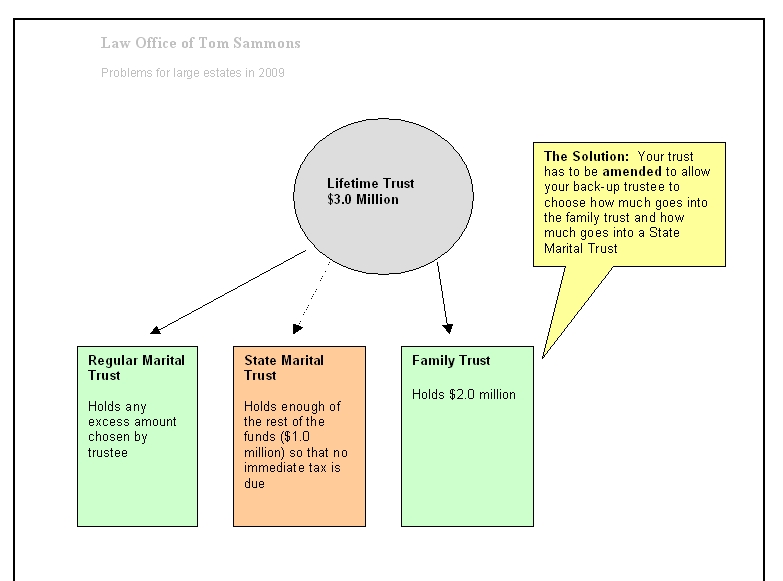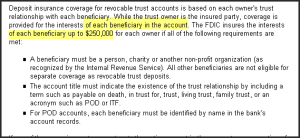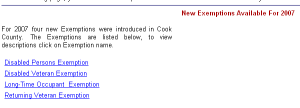Interesting tale of how a lender fired her client for requesting a “double lock” on his refinance (i.e. applying at two lenders and seeing who can get the best rate).
Obama aims for $3.5 million estate tax exemption
Word is that the new president will try to lock in the estate tax exemption amount at $3.5 million.
Large trusts may owe IL inheritance tax in 09

(4/9/09 Update: There is a bill pending in the Legislature that would eliminate this problem.)
For 2009, the amount that is free of estate tax under federal law is $3.5 million.
For 2009, the amount that is free of estate tax under Illinois law is $2.0 million. Illinois has “decoupled” from the federal estate tax system for 2009 (this only applies to 2009; after that we don’t have to worry about this problem).
This creates a potential inheritance tax time bomb for married couples with large estates. (This problem does not affect single, divorced or widowed people. They would, however, be wise to considering gifting to reduce their estate under $2.0 million to avoid the Illinois inheritance tax).
Who should worry about this? Married couples, who have A/B living trust and who have large estates.
How large of an estate? You should check into this if your estate is over $2 million. If your assets are under $2.0 million you don’t have to worry about it. For the most part it will affect couples with estates of about $3.0 million or so
What is the problem? The problem will occur on the first to die of a married couple, where the living trust of the deceased person contains more than $2.0 million.
Estate taxes may have to be paid on the first death. This is bad. No one wants to pay estate taxes, especially on the first death. The problem is the “funding formula” used in so called A-B living trusts that sets up the family and marital trusts. It says to put up to the federal exemption amount of $3.5 million in the family trust when the first spouse dies. Illinois will tax any amount over $2.0 million that goes into the family trust.
Unless the funding formula is amended to minimize inheritance taxes, it will trigger estate tax on the death of the first spouse.
How much would the tax be? If the trust of the deceased person has $3.5 million, then $2.0 million going to the family trust is not taxed by Illinois, but $1.5 million is taxed by Illinois. If the full $3.5 million goes into the family trust, the surviving spouse pays $229,200.00 in taxes to the state of Illinois. That’s no drop in the bucket.
What can I do to avoid paying this? The living trust has to be amended to add a third trust, so the client will have an A-B-C trust. The C trust is a “state marital trust” that prevents Illinois estate tax from be due on the first death in a married couple. It lets the backup trustee decide how much to put in the family trust and how much to put in the state marital trust and thereby avoids any tax on the first death.
Closing volume has nowhere to go but up
The Illinois Association of Realtors keeps real estate closing statistics. Read ‘em and weep…
In the Chicago area, the number of sales, comparing 2006 to 2005, was down about 12%.
The number of sales from 2006 to 2007 was down 20.5%
So far this year, the number of sales is down again from 2008 to 2007:
1st Quarter- 29% down
2d Quarter-33% down
3d Quarter- 22% down
October 08- 17% down
November 08- 32% down
It’s will probably down about 30% for 2008 after you add it all up.
So, basically the real estate market has lopped off close to 60% of its volume compared to 2005 (generally considered the peak).
Wow, I need a drink.
IRAs: No required distribution for 2009
Update: 12/27/08
The House and Senate have passed a bill (and it is expected that the president will soon sign it) (and the president signed it)that allows IRA owners to skip their required IRA distribution for 2009.
This applies to those over 70.5 AND to those who have inherited IRAs. Both categories will not have to take 2009 distributions.
It was hoped that there would be relief from taking 2008 required distributions, since those are based on 12/31/07 values, but it appears that will not happen.
First-time buyer tax credit questions answered
 There is a tax credit of $7500 to first time buyers. This site answers any and every question you might have about who qualifies for the credit and how it works.
There is a tax credit of $7500 to first time buyers. This site answers any and every question you might have about who qualifies for the credit and how it works.
FDIC limits rise for living trusts
The FDIC limits were increased recently to $250,000 for each beneficiary named in a living trust. So if you have three kids and your bank account is titled in your living trust, the FDIC protection is $750,000.
This protection bonus expires at the end of 2009. If you don’t believe me you can read it on the FDIC’s site.

How to create an Illinois Series LLC
A few years ago, Illinois authorized the Series Limited Liability Company (LLC).
A Series LLC is used primarily by real estate investors to hold title to multiple parcels of real estate. This presentation explains how to set up a series LLC in Illinois.
Are "Short sales" taxable?
“Short sales” are sale of real estate where the seller does not have enough money to pay off the existing mortgage(s). The lender reduces the amount owed voluntarily. The “forgiveness of debt” is taxable.
However, there is an exception if you sell your primary residence in a short sale and have lived there for at least two years before you sell. In that case, there is no tax due on the forgiveness of debt.
Unfortunately, this rule does not apply to any investment real estate or to second homes. If either of these types of properties are sold in a short sale, the amount of the loan that is “forgiven” is TAXABLE to the seller.
How to check exemptions on Cook Co. Real Estate Taxes
The exemptions on Cook Co. real estate taxes used to be :
1. Homeowner’s exemption;
2. Senior citizen exemption;
3. Senior Freeze.
We just got four more exemptions (disabled, disabled veteran, Long-Term Occupant and Returning Veteran). It used to be hard to understand, now it’s impossible!
If you are considering buying a property in Cook Co. you should know what exemptions are on the property, so that you get the correct tax credit. The easiest way to do this is to look at a copy of the second installment tax bill. Unfortunately, the Cook County Treasurer does not break down the exemptions on their website.
The next best way to check the exemptions is to use the Cook County Assessor’s website. Here is how to do it.